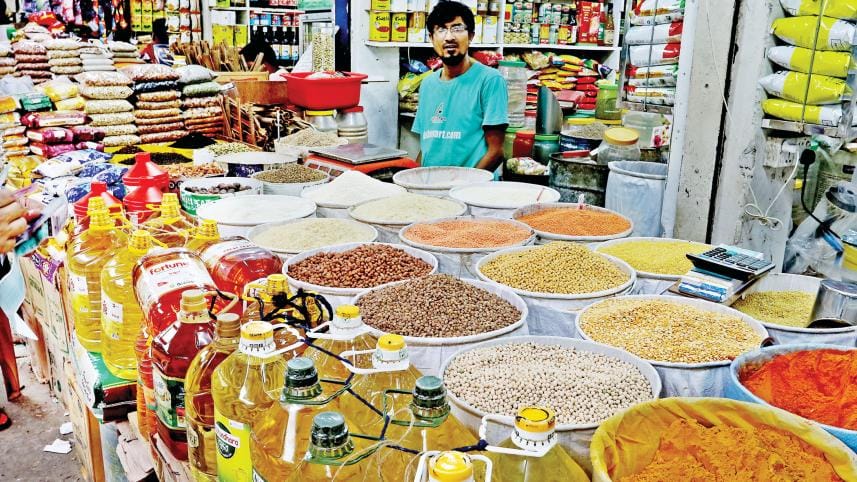Groceries may cost less next year if dollar stays stable

- World Bank forecasts lowest commodity prices
- Relief hinges on stable dollar exchange
- Energy, food costs projected to decline
- Fertiliser surge threatens farmers' profit margin
Households in Bangladesh could spend less on everyday essentials such as sugar, wheat, lentils and edible oil next year, as the World Bank forecasts global prices to fall to their lowest level in six years.
The relief, however, depends on a stable dollar rate within Tk 122 to Tk 123 and no major disruptions such as war or natural disasters affecting supply chains, importers said.
The World Bank Group's latest Commodity Markets Outlook predicts global commodity prices will fall for a fourth consecutive year in 2026, with a 7 percent decline expected in both 2025 and 2026.
The drop is being driven by weak global growth, rising oil supplies and ongoing policy uncertainty, it added.
Falling energy costs are helping to ease global inflation, while lower rice and wheat prices have made food more affordable in some developing countries, it said.
Inflation in Bangladesh has remained high for three years. In the fiscal year 2024-25, average inflation stood at 10.03 percent. It has eased slightly in recent months and reached 8.36 percent in September from 8.29 percent in August
Inflation in Bangladesh has remained high for three years. In the fiscal year 2024-25, average inflation stood at 10.03 percent. It has eased slightly in recent months, reaching 8.36 percent in September from 8.29 percent in August.
Even so, consumers continue to face higher prices for goods and services, and local importers say there is no guarantee that the cost of daily necessities will surely decline next year.
Despite recent falls, commodity prices remain above pre-pandemic levels, the World Bank said. Prices in 2025 and 2026 are projected to be 23 percent and 14 percent higher, respectively, than in 2019.
According to the multilateral lender, oil markets are expected to see a significant surplus in 2025, which could expand further next year to 65 percent above the most recent high in 2020. Slower growth in oil demand, rising popularity of electric and hybrid vehicles and stagnating consumption in China are contributing to the surplus.
Brent crude is forecast to fall from an average of $68 a barrel in 2025 to $60 in 2026, reaching a five-year low. Overall energy prices are projected to fall by 12 percent in 2025 and a further 10 percent in 2026.
Food prices are also easing. The World Bank predicts a 6.1 percent decline in 2025 and a 0.3 percent drop in 2026. Soybean prices are falling this year due to record production and trade tensions, but are expected to stabilise over the next two years. Coffee and cocoa prices could also fall in 2026 as supply improves.
Fertiliser prices, however, are projected to surge by 21 percent in 2025 because of higher input costs and trade restrictions, before easing by 5 percent in 2026. This may further squeeze the profit margins of farmers and raise concerns over future harvests.
Taslim Shahriar, senior assistant general manager at Meghna Group of Industries, a big commodity importer and processor, said soybean prices have risen by about 18 to 20 percent because of trade tensions between the United States and China.
He said some commodities have seen slight declines. Sugar prices have dropped, while edible oil and wheat have remained steady.
According to him, wheat prices have fallen slightly, from around $280 to $270 per tonne, while sugar has dropped from roughly $450 to $398 per tonne.
He expects some relief for consumers next year, provided there are no major natural disasters or global supply chain disruptions.
"If oil prices remain stable, inflation is likely to fall further," he said. "A stable dollar exchange rate within Tk 122 to Tk 123 would help ease inflation even more, given international prices have already come down."
Abul Bashar Chowdhury, chairman of Chittagong-based grain importer BSM Group, said market prices are likely to decrease for large businesses, but this does not guarantee retail prices will fall.
"The global market is just one factor. Other factors, such as dollar rates and higher bank interest rates, must also be considered," he added.
Biswajit Saha, director of corporate and regulatory affairs at City Group, another major importer and processor, said, "The main point is that if prices fall in the global market, it will also have an impact in Bangladesh, and consumers will benefit as well."
Preferring anonymity, an official of the Bangladesh Trade and Tariff Commission said if the World Bank forecast holds and other conditions remain stable, its impact will be reflected in the local market.
Given the current state of the balance of payments, the official expects the dollar rate to remain stable in the coming days.




 For all latest news, follow The Daily Star's Google News channel.
For all latest news, follow The Daily Star's Google News channel.
Comments